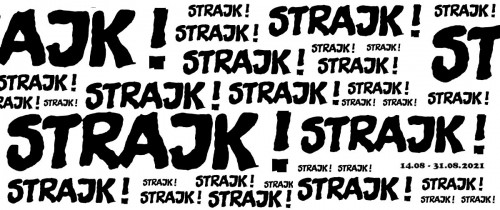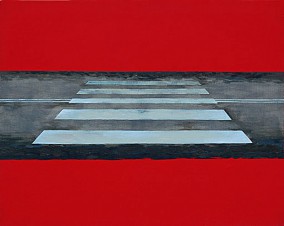
STRAJK!
14 August 2021 - 31 August 2021
ABOUT EXHIBITION
A strike - according to "Dictionary of Foreign Words" (PWN, Warsaw 1999) - is: a collective stopping of work for a certain period of time by employees of one or many plants, being a form of a struggle to realize their economic or political demands. (PWN, Warsaw 1999) - is a collective, voluntary cessation of work for a certain period of time by employees of one or many plants, being a form of struggle for the realization of their economic or political demands.The 1970s - the decade of Gierek and his team's rule - ended with a deep crisis of the structures of government and the economy, social bitterness and a lack of prospects for a decent life. There was a shortage of food, housing, the proverbial "toilet paper and binder string". Everything.
On July 1, 1980, the government introduced a rise in food prices. Strikes began to break out across the country. A special place in the organization of workers' revolts and their intensity was occupied by the Lublin region. From 8 to 24 July over 50 thousand people in 150 work establishments went on strike in Lublin and the region. The authorities were forced to establish a government commission to consider the demands of the Lublin workers and to sign, for the first time in the history of the Polish People's Republic, agreements with the strikers.
August 14, 1980 marked the beginning of the strike in the Lenin Gdańsk Shipyard, which was immediately followed by strikes in shipyards and factories in Gdynia, Szczecin, Elbląg, Słupsk and other places in the country. In addition to economic demands for improved living conditions, free trade unions were demanded. A meaningful, prudent game for the future of the country was being played. A game that the workers won. The independent, self-governing trade union SOLIDARITY was established, a spontaneous social movement was born which led to changes in the political system and democratization of public life.
Strikes in the summer of 1980 changed the course of Polish history.
The essence of artistic activities of that time was to comment on workers' and farmers' strikes and protests, to interpret the existing restrictions in the social space, evil, injustice, persecution. Art reflected the importance of opposition to the prevailing regime, the degeneration occurring, the extensive restrictions on freedom and independence. It helped to understand the changes taking place, inspired further transformations, and made people aware that freedom and goodness had to be fought for every day. The artists drew attention to social problems, anxieties and dilemmas, political reality; they documented the Polish road to freedom, emphasized the importance and necessity of dialogue.
The exhibition STRAJK! reminds that the birth of Solidarity was preceded by June '56, March '68, December '70, June '76, which not only triggered the process of political and social transformation, but also transformed the living conditions of Polish women and men; causing human actions to once again become a reflection of thoughts, emotions, dreams and beliefs.
Curator of the exhibition Jerzy Brukwicki

THANK YOU FOR LETTING YOUR FRIEND KNOW ABOUT OUR EVENT
Your e-mail has been sent successfully












































